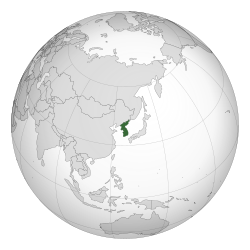People's Republic of Korea
| People's Republic of Korea | ||||||||||||
| 조선인민공화국 朝鮮人民共和國, |
||||||||||||
| Provisional government | ||||||||||||
|
||||||||||||
|
||||||||||||
|
Motto "자주독립국가(自主獨立國家)" (Korean) "Independent state of Korea" |
||||||||||||
| Capital | Seoul | |||||||||||
| Languages | Korean | |||||||||||
| Political structure | Provisional government | |||||||||||
| Chairman of the National People's Representative Conference | ||||||||||||
| • | 1945–1946 | Lyuh Woon-hyung | ||||||||||
| Historical era | Cold War | |||||||||||
| • | Surrender of Japan | September 6, 1945 | ||||||||||
| • | American forces stationed in Seoul | September 9, 1945 | ||||||||||
| • | Soviet forces stationed in Pyongyang | October 3, 1945 | ||||||||||
| • | People's Republic abolished | February 1946 | ||||||||||
| Currency | Won | |||||||||||
|
||||||||||||
| Today part of |
|
|||||||||||
| People's Republic of Korea | |
| Chosŏn'gŭl | 조선인민공화국 |
|---|---|
| Hancha | 朝鮮人民共和國 |
The People's Republic of Korea (PRK) was a short-lived provisional government that was organized with the aim to take over control of Korea shortly after the surrender of the Empire of Japan at the end of World War II. It operated as a government from late August to early September 1945 until the United States Army Military Government in Korea was established in the southern portion of the Korean Peninsula by the United States of America. After that it operated unofficially, and in opposition to the United States Army Military Government, until it was forcibly dissolved in January 1946.
The Imperial Japanese colonial authorities requested that a government be established to ensure the safety of their persons and property after the occupation ended. Under the leadership of Lyuh Woon-Hyung, the newly formed Committee for the Preparation of Korean Independence (CPKI) organized people's committees throughout the country to coordinate the transition to independence. On August 28, 1945 the CPKI announced that it would function as the temporary national government of Korea. On September 12, CPKI activists met in Seoul and established the PRK.
The program of the PRK was presented in its September 14 twenty-seven point program. The program included: "the confiscation without compensation of lands held by the Japanese and collaborators; free distribution of that land to the peasants; rent limits on the nonredistributed land; nationalization of such major industries as mining, transportation, banking, and communication; state supervision of small and mid-sized companies; …guaranteed basic human rights and freedoms, including those of speech, press, assembly, and faith; universal suffrage to adults over the age of eighteen; equality for women; labor law reforms including an eight-hour day, a minimum wage, and prohibition of child labor; and "establishment of close relations with the United States, USSR, England [sic], and China, and positive opposition to any foreign influences interfering with the domestic affairs of the state."
...
Wikipedia



